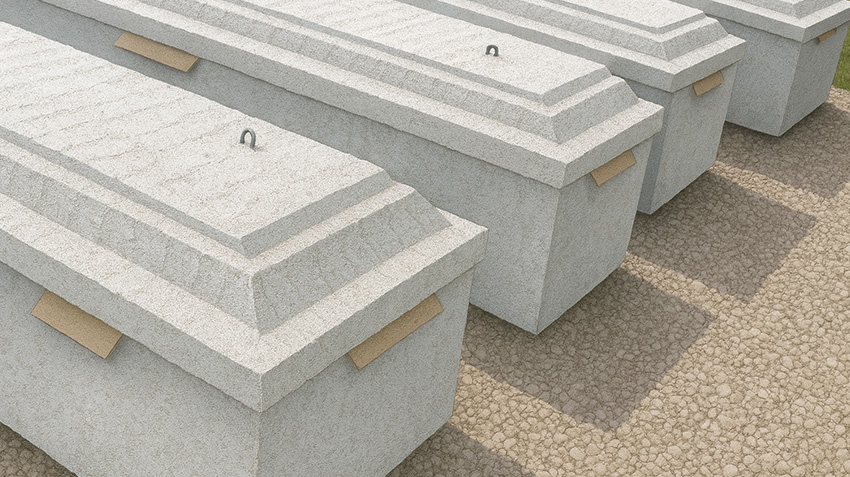
Dealing with funeral arrangements after the loss of a loved one can be overwhelming, especially when you’re faced with unfamiliar terms and decisions.
One of those decisions often involves choosing a burial vault. Burial vaults play a vital role in modern burials, both in terms of structural function and symbolic meaning. This guide explains the different types of burial vaults available today, helping families navigate these choices with greater understanding and confidence.
What is a burial vault, and why is it used?
A burial vault is a protective enclosure designed to surround the casket after it is placed in the ground. Its primary role is to prevent the collapse of the gravesite and to maintain the integrity of the cemetery grounds. While similar in function to a grave liner, a burial vault offers more comprehensive coverage by enclosing the casket on all sides, often with a tightly sealed lid.
Burial vaults are commonly used to comply with cemetery regulations and ensure the long-term preservation of burial plots. Beyond their practical purpose, some families choose vaults for emotional reasons, such as a desire to protect the memory and dignity of their loved one or to symbolize lasting care. Understanding the different types of burial vaults can make it easier to select one that aligns with your values and needs.
What are the different kinds of burial vaults?
Here are a few kinds of burial vaults you may consider for your loved one’s funeral:
1. Concrete Burial Vaults
Concrete burial vaults are one of the most widely used types of burial vaults. These are constructed from reinforced concrete, sometimes lined with materials like plastic or metal to enhance durability and resistance to moisture. They are highly effective in preventing the settling of soil and are generally accepted by most cemeteries.
Some concrete vaults come with special sealants or locking mechanisms to help prevent water and soil from entering. Decorative finishes are also available, allowing families to personalize the appearance of the vault. This option is particularly suitable for families seeking a traditional, reliable solution that offers long-term structural integrity.
2. Metal Burial Vaults
Metal burial vaults are considered a premium option. They are typically made from steel, bronze, or copper, each offering its own level of strength and resistance to corrosion. These vaults are often sealed to protect the casket from external elements and are praised for their durability and sleek appearance.
In addition to their structural benefits, metal vaults can hold aesthetic or symbolic value. Bronze and copper, for example, may represent timelessness or reverence. While this category of vault tends to be more expensive than others, many families find the visual appeal and lasting protection worth the investment.
3. Composite and Plastic Burial Baults
Composite burial vaults are made from materials such as high-strength resin, polymers, or fiberglass. These vaults are lightweight but surprisingly durable, offering solid protection at a more affordable price point. Unlike traditional concrete or metal options, composite vaults are easier to transport and install.
Some of these vaults are designed with eco-conscious materials or processes, making them attractive to families who value sustainability. They also come in a range of colors and designs, giving families more choices in terms of appearance. These kinds of burial vaults are a good fit for those looking for a non-traditional but effective burial option.
4. Grave Liners
Grave liners are often confused with burial vaults, but they serve a slightly different purpose. Unlike vaults, which fully enclose the casket, grave liners only cover the top and sides. They do not provide a sealed environment and are generally less expensive.
Cemeteries often require at least a grave liner to prevent ground settling and maintain a level surface. While they offer less protection than full vaults, they are still a practical and cost-effective solution for many families. Grave liners may appeal to those who prefer a simpler approach to burial or are working within a tighter budget.
5. Eco-Friendly Burial Vaults
As environmental awareness grows, more families are seeking sustainable burial options. Eco-friendly burial vaults are made from biodegradable materials like untreated wood, reinforced cardboard, or natural stone. These vaults are ideal for green burials, where the goal is to minimize environmental disruption and allow natural decomposition.
Eco-friendly options are often used in conservation cemeteries or natural settings where traditional vaults are discouraged or prohibited. However, it is important to verify that the chosen cemetery allows these types of burial vaults. For families committed to an environmentally responsible farewell, these vaults provide a meaningful and respectful solution.
Choosing the right burial vault for your loved one
Selecting the right burial vault involves several considerations. First and foremost, check with the cemetery to understand their specific requirements, as not all kinds of burial vaults are permitted everywhere. Budget is also an important factor, as vaults can range significantly in price based on material and design.
Personal and family values often influence this choice as well. Some families prioritize tradition, while others focus on aesthetics, symbolism, or environmental concerns. It can also be helpful to consider how the vault fits into the overall look and feel of the funeral or burial service. Don’t hesitate to ask questions at the funeral home or cemetery to ensure you understand all available options.
What are some common myths about burial vaults?
A common misconception is that burial vaults prevent decomposition. In reality, no vault can stop the natural process of decay, though sealed vaults may slow it down slightly. Another myth is that all vaults are waterproof. While some are sealed to resist moisture, not all offer complete water resistance, and none are guaranteed to be entirely waterproof over time.
Many families also believe that burial vaults are always required, but this depends on the cemetery. Some locations allow direct burial or only require grave liners. It’s important to check with the cemetery before making assumptions or commitments.
Frequently Asked Questions
Below are some commonly asked questions to consider:
Do cemeteries charge extra for using a burial vault?
Yes, there may be additional fees for handling and installing a burial vault, especially if the model is heavy or requires special equipment. Funeral homes or cemeteries can provide detailed cost breakdowns.
Can I customize the burial vault’s appearance?
Many manufacturers offer vaults with decorative finishes, engravings, or colors. Customization can reflect the personality or beliefs of your loved one and make the burial more meaningful.
Are burial vaults reused or recycled?
No, burial vaults are intended for one-time use and remain underground permanently. However, some manufacturers produce vaults with recycled materials.
Understanding the different types of burial vaults helps families make confident decisions
Navigating funeral planning while grieving is never easy, but understanding the different types of burial vaults can bring clarity during an emotional time. Whether you’re drawn to the durability of concrete, the elegance of metal, or the environmental mindfulness of biodegradable materials, each option serves a unique purpose. By learning about these choices, families can make informed decisions that honor their loved one’s memory with care and dignity.
Speak to a professional funeral services provider to help you choose the ideal burial vault for your loved one.



